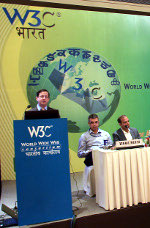News
W3C Opens India Office during International Conference in New Delhi
03 May 2010 | Archive
 As part of its efforts to ensure that core Web standards meet global needs, W3C announces today the opening of a new Office in India. The Office is hosted in New Delhi by the Technology Development for Indian Languages (TDIL) Programme, part of the India government's Department of Information Technology. W3C and TDIL will celebrate this collaborative effort at an opening ceremony
on 6 May 2010, as part of a conference organized by TDIL on the topic of technology, standards and internationalization. "Increased participation from India will strengthen W3C's international community," said Jeff Jaffe, W3C CEO. "I look forward to partnering with TDIL so that we build the W3C community in India, including drawing Membership from key industrial and academic leaders. The upcoming conference is an important first step." Read more in the press release and learn about the W3C Offices Program. Photo credit: Richard Ishida
As part of its efforts to ensure that core Web standards meet global needs, W3C announces today the opening of a new Office in India. The Office is hosted in New Delhi by the Technology Development for Indian Languages (TDIL) Programme, part of the India government's Department of Information Technology. W3C and TDIL will celebrate this collaborative effort at an opening ceremony
on 6 May 2010, as part of a conference organized by TDIL on the topic of technology, standards and internationalization. "Increased participation from India will strengthen W3C's international community," said Jeff Jaffe, W3C CEO. "I look forward to partnering with TDIL so that we build the W3C community in India, including drawing Membership from key industrial and academic leaders. The upcoming conference is an important first step." Read more in the press release and learn about the W3C Offices Program. Photo credit: Richard Ishida
Incubator Report: Model-Based User Interfaces
06 May 2010 | Archive
The Model-Based User Interfaces Incubator Group (MBUI-XG) published their final report today. During the last year the MBUI-XG has evaluated research on MBUIs, including end-to-end models that extend beyond a single Web page, and has assessed its potential as a framework for developing context-sensitive Web applications. This report gives an overview of the main results achieved by such an Incubator Group. W3C has also organized a Workshop on Future Standards for Model-Based User Interfaces (13-14 May 2010, Rome) to identify opportunities and challenges for new open standards in this area, particularly concerning the semantics and syntaxes of task, abstract and concrete user interface models. This publication is part of the Incubator Activity, a forum where W3C Members can innovate and experiment. This work is not on the W3C standards track.
XML Linking Language (XLink) 1.1 is a W3C Recommendation
06 May 2010 | Archive
The XML Core Working Group has published a W3C Recommendation of XML Linking Language (XLink) Version 1.1. This specification defines the XML Linking Language (XLink) Version 1.1, which allows elements to be inserted into XML documents in order to create and describe links between resources. It uses XML syntax to create structures that can describe links similar to the simple unidirectional hyperlinks of today's HTML, as well as more sophisticated links. Changes from XLink 1.0 include: xlink:type is no longer required for simple links, IRIs are used instead of URIs, and the specification includes non-normative sample XML Schema and RELAX NG grammars. Learn more about the Extensible Markup Language (XML) Activity.
Community Contributions to W3C Validator Campaign Lead to Engineer Hire
05 May 2010 | Archive
W3C is pleased to announce that, thanks to community contributions to the W3C Validator Campaign, Thomas Gambet will spend the next year at W3C turning the Unicorn project into a production service. The Unicorn Project aims to provide the big picture about the quality of a Web page by gathering the results of various tools into a single page. Both Unicorn and the W3C's Validators are open source projects. W3C invites developers to participate in these projects or to provide feedback on functionality: what functionality do you want next? what are your thoughts on the user interface? Please send feedback to public-unicorn@w3.org. Learn more about getting involved with Unicorn development, trying out Unicorn, and providing translations for it.
W3C offers HTML, CSS, and other validation services at no cost to the Web developer and designer communities. W3C invites you to make a contribution to support these services.


